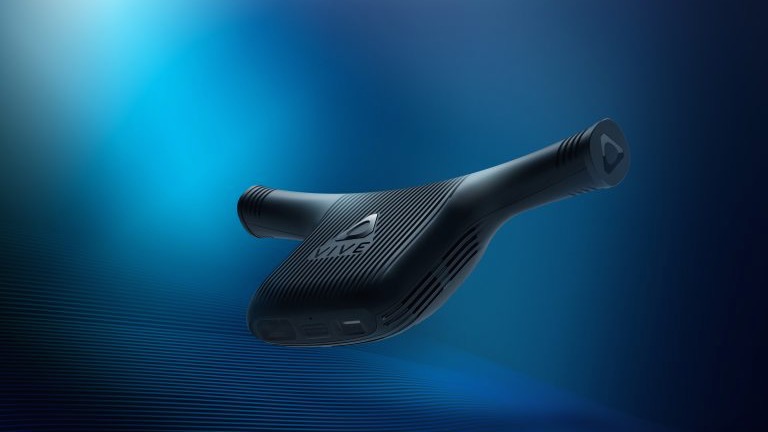Game changer? HTC Vive and Vive Pro headsets go wireless with new adapter
HTC's virtual reality headsets break free

HTC has unveiled a new Wireless Adapter for the HTC Vive virtual reality headset as well as the just-announced HTC Vive Pro. The adapter and the new, upgraded VR headset were both revealed at a press event at CES 2018 in Las Vegas.
HTC says the adapter will be the first to market in offering a truly wireless VR headset solution for both of its headsets.
The adapter, which looks like a square disk with two prongs sticking out of the top, is built with Intel's WiGig technology. Intel killed off some of its WiGig products late last year, shifting its focus to enabling wireless VR. This appears to be the first fruit of those efforts.
WiGig is essentially a short-range 802.11d connectivity standard, which operates over the 60GHz frequency. It allows for wireless docking and high-speed connections, though at a fairly close range. And it's true: the adapter's range is about 15 feet, HTC tells us.
According to HTC, operating at the 60Ghz band means lower latency and better performance, though we'll have to test the adapter out for ourselves to see just how it stacks up to the tethered experience.
The Vive Wireless adapter will launch in Q3 this year to customers around the world. No word yet on price.
Viva Vive
In addition to a new headset and wireless adapter, HTC also announced a big overhaul of Viveport, the storefront for HTC's VR content.
Get daily insight, inspiration and deals in your inbox
Sign up for breaking news, reviews, opinion, top tech deals, and more.
First up, there's a new name: Viveport VR. Users will see interactive previews of content, giving users a room-scale look at experiences before they commit. The new Viveport VR is available in early access today.
HTC also pushed out an upgrade to its native VR video player. Vive Video is not only getting some new features and a refreshed UI, but now content from Vimeo will be served up.
A curated collection of Vimeo videos will be served to users, helping them peruse videos that are optimized for VR.
HTC's announcements are sizeable, to be sure, and though the cost of HTC Vive is still prohibitive, the company seems content to carve out a higher-end niche for itself in the VR space while Oculus Rift goes for the middle.
It's wise, though, for HTC to bring a wireless option to its headset; Oculus announced the Oculus Go headset last year, which doesn't require a wire or smartphone. HTC needed something to put itself into the wireless conversation, and this new adapter may do the trick. That is, if it's not too expensive.
- New year, new tech – check out all our coverage of CES 2018 straight from Las Vegas, the greatest gadget show on Earth!
Michelle was previously a news editor at TechRadar, leading consumer tech news and reviews. Michelle is now a Content Strategist at Facebook. A versatile, highly effective content writer and skilled editor with a keen eye for detail, Michelle is a collaborative problem solver and covered everything from smartwatches and microprocessors to VR and self-driving cars.
